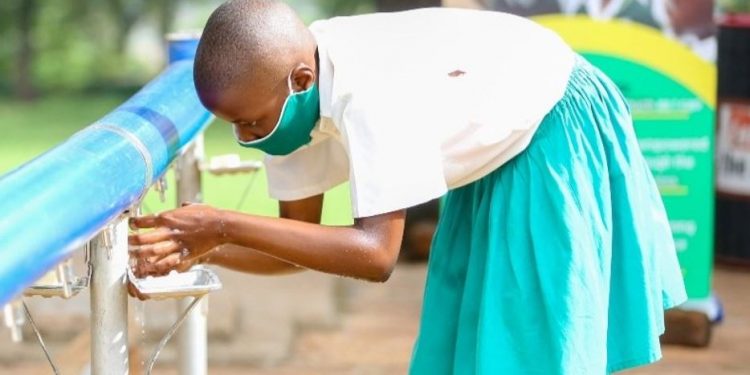A new report by WHO and UNICEF, released today on Global Handwashing Day, reveals that giving everyone in the world’s poorest countries access to handwashing with soap and water, would cost around $11 billion. That would transform the life-chances of people who are currently unable to simply wash their hands at home.
“Millions of lives could be saved and billions of dollars in untapped economic potential could be unlocked for the equivalent of just $1.40 per head of the global population”, says WaterAid.
As G20 leaders prepare to gather in Rome to improve pandemic preparedness, WaterAid warns that government investment must be made to provide handwashing for all as it plays a critical role in the fight against preventable diarrhoeal diseases and respiratory infections.
According to latest estimates from WHO and UNICEF, three in 10 people worldwide cannot wash with soap and water at home, and at current rates of progress, 1.9 billion people – families and children – will still be unable to so by 2030.
WaterAid’s own recent analysis in its Mission Critical report, concluded that trillions of dollars could be unlocked over the next two decades through universal access to water, sanitation and hygiene. Achieving this could generate a net benefit of $45bn per year, and even just providing a tap in every household could yield $37bn USD annually.
WaterAid warned today that progress is worryingly slow. For everyone to be able to wash their hands at home by 2030, one of the UN’s Sustainable Development Goals, governments need to make progress at least four times faster than they currently are. However, the economic value of handwashing for all, alongside water and sanitation services, is vastly underestimated by governments, business and donors, resulting in chronic under-investment.
Investing in water, sanitation and hygiene brings multiple wins for governments, WaterAid says: it is value for money, it helps achieve health targets and it increases productivity to support economic growth. If governments invested in even basic water, hygiene and toilets it would bring a return on investment of up to 21 times the cost.
The provision of basic water services could save women and girls the equivalent of 77 million working days per year that they currently spend on fetching water, increasing their life and work options and greatly contributing towards gender equality. Good hygiene can reduce diarrhoeal and respiratory diseases at low cost, improving people’s health, reducing the costs of healthcare and freeing up people’s productive time.
Achieving universal access to hygiene services by 2040 could prevent 96 million cases of diarrhoeal disease and 160 million respiratory infections each year. This equates to less than $10 USD spent to avoid each case. According to WaterAid’s research, this could save up to $39 bn in lost productivity.
Olutayo Bankole-Bolawole, Regional Director of WaterAid in East Africa said:
“Promoting handwashing has proven to be cost-effective. Investments in health, education, and improved water supply are all jeopardised if handwashing with soap is not included in national development plans. In East Africa, WaterAid has partnered with national and local governments in enhancing access to hand hygiene in public places such as schools, hospitals, and markets. More recently, we worked with national Governments, WASH networks and the East Africa Community (EAC) to construct WASH facilities in six border points across the region, which has been critical in responding to the COVID-19 pandemic.
It is imperative that Governments should not wait for another pandemic to hit our Nations before investing in the health and well-being of our people and our economies through effective budgeting for Hygiene behaviour change and access to clean water and soap for our people in East Africa”.
Claire Seaward, WaterAid’s Global Campaigns Director said:
“As the G20 prepare to gather, it’s time governments and donors pay attention to the fact that an investment in water, sanitation and hygiene is a life-saving investment in future health and economic prosperity. These simple, but essential facilities have been side-lined for far too long, their value overlooked, crippling economies and trapping millions – especially women and girls – in poverty and poor health.
“Now is the time for action. Governments need to kickstart behaviour change, set out clear roadmaps for achieving hand hygiene for everyone by 2030, and ringfence the financing to achieving it. Partnerships with businesses will be crucial to strengthening supply chains for hygiene products and services. Donors need to rapidly increase their financial support in low and middle-income countries, recognising the critical role that hand hygiene has in pandemic preparedness and addressing anti-microbial resistance.”











